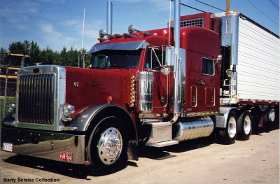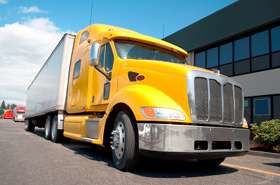A Question For The Prime Guys
Topic 6517 | Page 1
I drove a food grade tanker for a year one time and it was pretty cool. I liked it. If you're referring to food grade it's great. If you're referring to chemical tankers I would avoid it. If you're referring to dry bulk it's pretty decent.
As far as chemical tankers, you can make good money and plenty of people are out there doing it right now. But when it comes to the type of freight you're hauling, why haul hydrogen peroxide and sulfuric acid when you can haul honey and orange juice for the same amount of money, right? Far easier, safer, and much less scrutiny (no Hazmat).

I usually tell new drivers to wait a year before getting into any sort of liquid tanker. Bulk tanker is ok for your first year. But the liquid tankers are extremely difficult to drive and extremely dangerous. I wouldn't feel comfortable telling anyone to do that straight out of school and if I was in charge of hiring for liquid tankers I would never take anyone with less than a year OTR experience.
We have a series of articles on choosing the right truck driving job which includes an eight part series that I wrote. Scroll down the page a bit and you'll see the ones I'm referring to. They include Choosing A Truck Driving Job Part VII: Tankers and Flatbeds and Choosing A Truck Driving Job Part VI: Dry Van and Refrigerated Companies.
HAZMAT:
Hazardous Materials
Explosive, flammable, poisonous or otherwise potentially dangerous cargo. Large amounts of especially hazardous cargo are required to be placarded under HAZMAT regulations
OTR:
Over The Road
OTR driving normally means you'll be hauling freight to various customers throughout your company's hauling region. It often entails being gone from home for two to three weeks at a time.
Dry Van:
A trailer or truck that that requires no special attention, such as refrigeration, that hauls regular palletted, boxed, or floor-loaded freight. The most common type of trailer in trucking.OOS:
When a violation by either a driver or company is confirmed, an out-of-service order removes either the driver or the vehicle from the roadway until the violation is corrected.

Prime won't let you go straight to tanker in the first place because of how difficult they are to drive, so you are going to most likely do refrigerated before you do anything with tanker.

Prime tankers haul all food grade.
The cool kids do flatbed though.

And here I thought all the cool kids were reefer addicts.
Reefer:
A refrigerated trailer.

Prime won't let you go straight to tanker in the first place because of how difficult they are to drive, so you are going to most likely do refrigerated before you do anything with tanker.
Not saying you are incorrect or anything Josh because you may very well be correct, I was just relaying what was told to me by my recruiter Julie. She stated that I would start my training on a reefer and then finish up with tanker and then transition into east coast regional pulling a tanker. I was merely looking to get some insight from guys that have been with Prime for a while to see what they knew about the tanker division and if the pay would balance itself out. I know Tankers make a little bit more than reefer but i am assuming less miles overall because of the regional nature of it.
Regional:
Regional Route
Usually refers to a driver hauling freight within one particular region of the country. You might be in the "Southeast Regional Division" or "Midwest Regional". Regional route drivers often get home on the weekends which is one of the main appeals for this type of route.
Reefer:
A refrigerated trailer.
I've wondered the same thing about tanks. I've heard it takes alot longer to go from load to load if you haul different freight due to the washout times between loads. I don't see many tankers in truck stops and that is enough for me to want to do it. Trying to find parking after 500pm is a real b word. And after 800 pm forget it. I get night deliveries at Wal-Mart fairly often and out of the dozen or so Wal-Mart dc's I've delivered to, only 1 has parking next to the dc on the road outside the dc. And that's no facilities. So I'm stuck doing laps around the lot waiting on someone to leave. Sorry going off topic.
From what I understand alot of the places you deliver with a tanker have overnight parking.
I think a plus is they're smaller trailers but a down side is you're always heavy.
I'd like to drive tanks but Prime doesn't have them available if you live in Florida.
I started at Prime in September and know of two newbies who went to tanker for TNT after doing PSD on a reefer.
Reefer:
A refrigerated trailer.
PSD:
Prime Student Driver
Prime Inc has a CDL training program and the first phase is referred to as PSD. You'll get your permit and then 10,000 miles of on the road instruction.
The following is from Prime's website:
Prime’s PSD begins with you obtaining your CDL permit. Then you’ll go on the road with a certified CDL instructor for no less than 75 hours of one-on-one behind the wheel training. After training, you’ll return to Prime’s corporate headquarters in Springfield, Missouri, for final CDL state testing and your CDL license.
Obtain CDL Permit / 4 Days
- Enter program, study and test for Missouri CDL permit.
- Start driving/training at Prime Training Center in Springfield, Missouri.
- Work toward 40,000 training dispatched miles (minimum) with food allowance while without CDL (Food allowance is paid back with future earnings).
On-the-Road Instruction / 10,000 Miles
- Train with experienced certified CDL instructor for 3-4 weeks in a real world environment.
- Get 75 hours of behind-the-wheel time with one-on-one student/instructor ratio.
- Earn 10,000 miles toward total 40,000 miles needed.
TNT:
Trainer-N-Trainee
Prime Inc has their own CDL training program and it's divided into two phases - PSD and TNT.
The PSD (Prime Student Driver) phase is where you'll get your permit and then go on the road for 10,000 miles with a trainer. When you come back you'll get your CDL license and enter the TNT phase.
The TNT phase is the second phase of training where you'll go on the road with an experienced driver for 30,000 miles of team driving. You'll receive 14¢ per mile ($700 per week guaranteed) during this phase. Once you're finished with TNT training you will be assigned a truck to run solo.

Prime does hire new drivers into tanker div. I got my CDL in Aug 14 in AL. Got hired in Sep. I still have about 2 more weeks before I upgrade. My trainer used to drive reefer and says he likes tanker side better. He averages about 2000-2500 miles/ week when not with a trainee. Not all receivers have over night parking. It took me about 2-3 weeks to get used to the sludge.....stopping, shifting, etc...
CDL:
Commercial Driver's License (CDL)
A CDL is required to drive any of the following vehicles:
- Any combination of vehicles with a gross combined weight rating (GCWR) of 26,001 or more pounds, providing the gross vehicle weight rating (GVWR) of the vehicle being towed is in excess of 10,000 pounds.
- Any single vehicle with a GVWR of 26,001 or more pounds, or any such vehicle towing another not in excess of 10,000 pounds.
- Any vehicle, regardless of size, designed to transport 16 or more persons, including the driver.
- Any vehicle required by federal regulations to be placarded while transporting hazardous materials.
Reefer:
A refrigerated trailer.

Word on the street is TNT pay will be raised again to $800 per week effective January 1st.
TNT:
Trainer-N-Trainee
Prime Inc has their own CDL training program and it's divided into two phases - PSD and TNT.
The PSD (Prime Student Driver) phase is where you'll get your permit and then go on the road for 10,000 miles with a trainer. When you come back you'll get your CDL license and enter the TNT phase.
The TNT phase is the second phase of training where you'll go on the road with an experienced driver for 30,000 miles of team driving. You'll receive 14¢ per mile ($700 per week guaranteed) during this phase. Once you're finished with TNT training you will be assigned a truck to run solo.
New Reply:
New! Check out our help videos for a better understanding of our forum features

















Preview:








 TT On Facebook
TT On Facebook
So my recruiter was talking to me about the different divisions, and I was interested in the tanker, I was wondering if you guys could tell me more about that division as far as equipment, miles, anything to help me make a decision really. She told me that they get less miles than the Refrigerated guys because it is East Coast but that the pay makes up for it. She also told me that I can choose to drive either refrigerated or tanker. So I am just trying to get some perspective from some guys that are there or driving it and have real life experience with it. Thanks in advance!
OOS:
When a violation by either a driver or company is confirmed, an out-of-service order removes either the driver or the vehicle from the roadway until the violation is corrected.